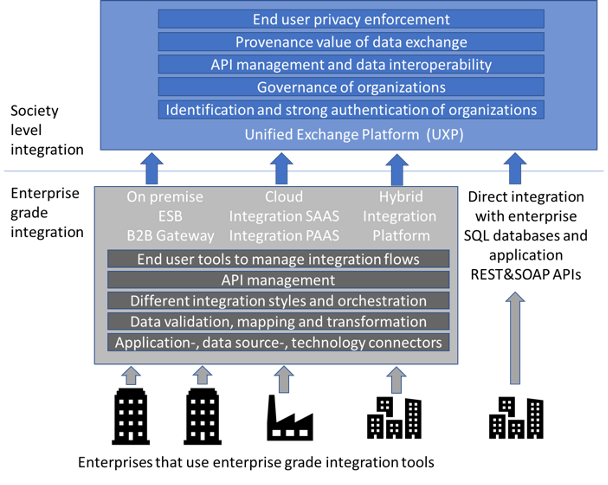“End-users of digital services must be able to take care of their privacy.”
UXP creates interconnected information societies with security and personal privacy in mind. It offers a unique set of information exchange, organization governance, provenance, and privacy features that are required when a large number of organizations need to interoperate together in a digital environment. Society-level digital transformation differs a lot from enterprise-level transformation. Below are the key differentiators of UXP compared to enterprise integration technologies.
Scalability
First, in society, the integration happens on a much larger scale. Thus, it must be more resilient to the risks. UXP distributed software architecture helps to achieve both goals. Without a central node, the digital society can scale infinitely without performance problems. Decentralized architecture means that the digital society is also much less vulnerable to technical problems or cyber-attacks.
Security
The goal of UXP is to establish trust in the ecosystem. However, as we know, one bad apple can spoil the barrel. Security issues can often arise if we allow organizations with various cyber-hygiene levels to establish connections case by case over the public internet. As a solution, UXP offers high-level confidentiality and integrity of the integrations in a standardized way. Organizations have to install UXP Security Server to the perimeter of their organization network, and the UXP component will take care of the security of the connections over the public internet.
Governance
Societies need means to enforce responsible behavior of their member organizations. UXP achieves this by the governance of organizations, strong authentication of organizations, and support of the legal framework.
It is the responsibility of the Governing Authority (GA) to identify and validate the organizations that want to join UXP. GA monitors the activity in UXP network and resolves disputes between the member organizations. The latter is made easy in UXP. Since UXP uses strong authentication, all member actions are traceable back to their originator. Information exchange in UXP is logged, timestamped, and thus GA can use it as evidence when solving disputes.
Privacy of end-users is a paramount
End-users of digital services must be able to take care of their privacy. UXP helps them in several ways. First, UXP allows end-users to have an overview of organizations and services that have accessed their data. It also provides control over what personal information end-users want to share with UXP member organizations. When access to private data is not granted to the organization by law, citizens can consent to organization access to the data.
The role of enterprise-grade integration technologies
Enterprise-grade integration technologies like API Gateways, ESB , IPAAS and HIP are still useful as they help organizations to access various data sources and services and to standardize the output before exchanging the result with the rest of the UXP member organizations.

The role of enterprise integration software in the society level integration
Conclusion
In short, society functions differently compared to enterprise and so do their digital twins. This is why we have created UXP – to serve the data integration needs of the digital society. In such a digital ecosystem, trust is paramount. UXP achieves it using standardized security, governance, and privacy features.
